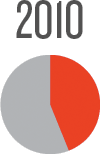Authorities blocked reporting of unrest occurring around the world, from Inner Mongolia to the Occupy movement. More than half of the 27 journalists imprisoned on December 1 were from Tibet and Xinjiang, reflecting crackdowns after earlier unrest in minority regions. After online calls for Arab Spring-style demonstrations, dubbed the Jasmine revolution, CPJ documented the worst harassment of foreign journalists since the 2008 Olympics, including beatings and threats. Police detained dissidents–including outspoken artist Ai Weiwei–and writers they feared could galvanize protests, often without due process, and kept them under surveillance after release. Draft revisions to the criminal code would allow alleged antistate activists to be held in secret locations from 2012. Officials obstructed reporting on public health and food safety issues, among other investigations. President Hu Jintao’s U.S. visit and two bilateral dialogues, one on human rights, made little headway on press freedom, but domestic activists successfully challenged censorship using digital tools, especially microblogs.
China
» Fearing unrest, authorities crack down on critics. Minority journalists are also targeted.
» Growth of social media, particularly microblogs, tests Internet censorship.
Authorities blocked reporting of unrest occurring around the world, from Inner Mongolia to the Occupy movement. More than half of the 27 journalists imprisoned on December 1 were from Tibet and Xinjiang, reflecting crackdowns after earlier unrest in minority regions. After online calls for Arab Spring-style demonstrations, dubbed the Jasmine revolution, CPJ documented the worst harassment of foreign journalists since the 2008 Olympics, including beatings and threats. Police detained dissidents–including outspoken artist Ai Weiwei–and writers they feared could galvanize protests, often without due process, and kept them under surveillance after release. Draft revisions to the criminal code would allow alleged antistate activists to be held in secret locations from 2012. Officials obstructed reporting on public health and food safety issues, among other investigations. President Hu Jintao’s U.S. visit and two bilateral dialogues, one on human rights, made little headway on press freedom, but domestic activists successfully challenged censorship using digital tools, especially microblogs.
Analysis: China Holds Fast to Information Control
Internet users posed ever-bigger challenges to Beijing’s media controls, boosting debate on public safety and censorship. But ahead of a 2012 leadership transition, the Chinese Communist Party looks likely to fiercely suppress dissent. Analysis by Madeline Earp
-
17
Jailed minority journalists -
27
Imprisoned on December 1, 2011 -
81
Days Ai detained -
200
Million Weibo accounts -
6
Guangzhou sanctions
China ceded its position as the world’s leading jailer of journalists, a distinction it shared with Iran in 2010. Yet cases of journalists and activists under “soft detention” in their homes increased. Hong Kong’s Chinese Human Rights Defenders reported more than 200 such detentions in March; almost all were subsequently lifted, the group said.
World's worst jailers in 2011:
1. Iran: 42
2. Eritrea: 28
3. China: 27
4. Burma: 12
5. Vietnam: 9
5. Syria: 8
Documentarian Ai and associates disappeared in April to international condemnation. State media accepted his irregular arrest. Though penalized for allegedly delinquent taxes, he was never charged. Newspapers debated draft legalization of secret detentions for 2012.
Systematic harassment of government critics:
171: Days blogger Ran Yunfei was imprisoned before being released to residential surveillance.
3: One-day disappearances of lawyer and blogger Xu Zhiyong, reported on May 7, May 20, and June 22.
2: Delays to writer Chen Wei's antistate prosecution for insufficient evidence, Radio Free Asia reported.
100: Unidentified individuals guarding activist Chen Guangcheng under residential surveillance in October, according to Human Rights in China.
The Twitter-like provider supported 56.5 percent of China's microbloggers in 2010, according to state media.
Authorities began intensifying control of Sina corporation's Weibo after users shared news faster than authorities could censor it.
Grappling for control:
26 million: Microblog messages protesting government handling of June's high-speed rail crash, according to The New York Times.
12,000: Northeastern Dalian residents who joined environmental protests organized online, according to the BBC.
2: Weibo accounts suspended for alleged rumor-mongering in August.
3: Weibo users punished, including one 15-day detention, for inaccurate postings in October.
Traditionally lenient Guangzhou authorities suspended Southern Media Group colleagues Zhang Ping, Chen Ming, and Song Zhibiao; Time Weekly's Peng Xiaoyun; and Nanfang Chuang's Chen Zhong and Zhao Lingmin. Each was disciplined for critical commentary.
Investigative journalists faced reprisals as well:
1: China Economic Times' investigative unit was dismantled.
1: A Caixin reporter's personal email was hacked after an investigation into child trafficking.
2: Beijing newspapers were stymied by a transfer of management from Guangzhou to the stricter capital, Hong Kong's China Media Project wrote.




